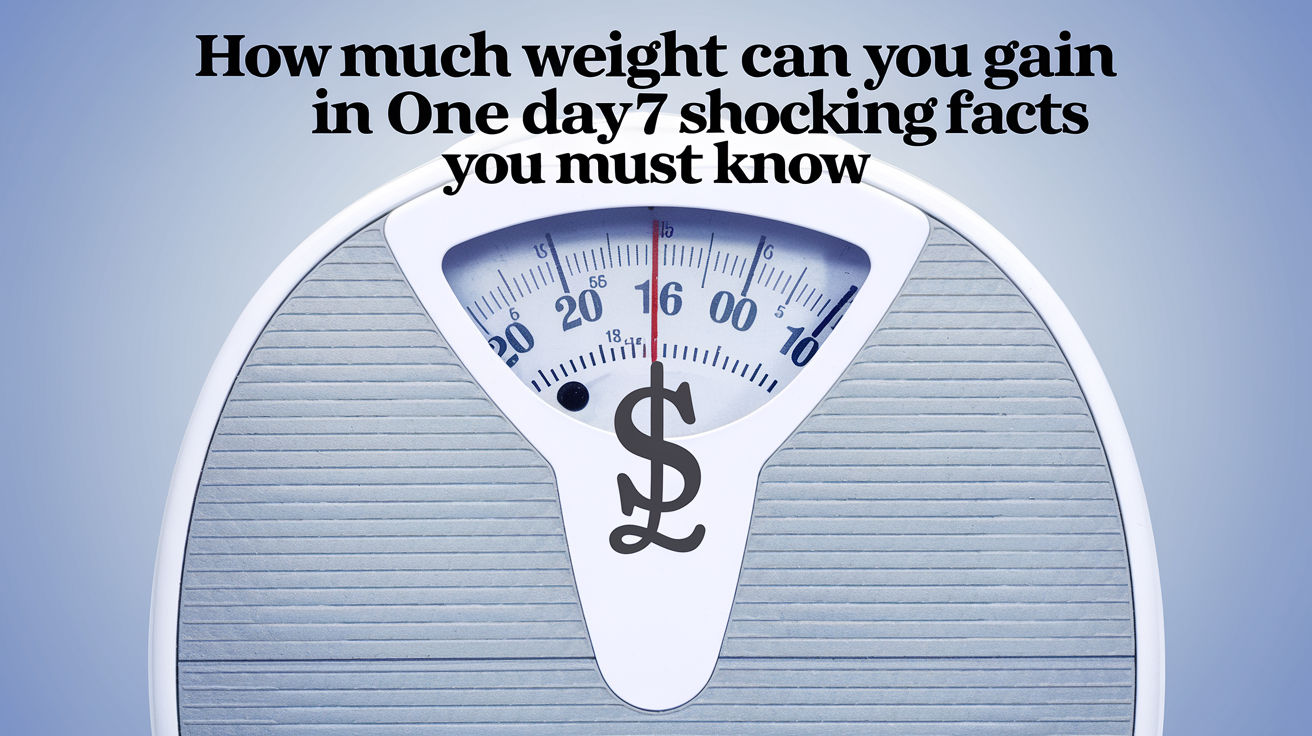Table of Contents
Have you ever wondered how much weight you can gain in one day? It’s a question many people ask, especially after indulging in a big meal or celebrating a special occasion. Understanding how much weight you can gain daily can help you navigate your health journey without stress. In this article, we’ll uncover 7 shocking facts that will help you understand the dynamics of daily weight gain. By the end, you’ll have a clearer picture of what happens when the scale tips up after just one day.
How Much Weight Can You Gain in One Day? The Surprising Role of Water Weight

Water weight significantly affects how much weight you can gain in one day. After a high-sodium meal or a day filled with salty snacks, your body retains more water to balance the sodium levels. This can lead to an increase in your weight by a few pounds almost instantly. However, this weight gain is temporary and usually resolves within a day or two once your body restores its average balance. This means the sudden increase on the scale isn’t fat gain but excess water retention.
The Impact of Overeating: How Much Weight Can You Gain in One Day?
Overeating, especially foods high in calories and fat, can lead to weight gain. However, how much weight can you gain from overeating in a single day? You must consume an extra 3,500 calories above your maintenance level to gain one pound of fat. So, unless you eat a massive amount of food, it’s unlikely to gain several pounds of fat in just one day. Most weight gain after overeating combines food weight, water retention, and temporary bloating.
How Much Weight Can You Gain in One Day from Carbohydrate Loading?
Carbohydrates can also cause a temporary weight increase due to water retention. Your body stores about three grams of water for every gram of carbs you consume. This can lead to a noticeable increase on the scale, especially if you’ve indulged in a carb-heavy meal. But again, this is mostly water weight, which will drop as your body processes and uses the carbohydrates.
Alcohol Consumption and How Much Weight Can You Gain in One Day

Alcohol is another factor that can contribute to daily weight gain. Alcohol contains empty calories, which means they don’t provide nutritional value but still contributes to your daily calorie intake. Moreover, alcohol can cause dehydration, leading your body to retain water once you rehydrate. This combination of added calories and water retention can lead to a temporary increase in weight.
How Much Weight Can You Gain in One Day Due to Stress?
Stress can also affect how much weight you can gain in one day. When you’re stressed, your body releases a hormone called cortisol, which can cause your body to hold onto extra fat and water. Additionally, stress might lead you to eat more than usual, especially comfort foods that are high in calories, contributing further to weight gain.
Exercise and How Much Weight Can You Gain in One Day
Believe it or not, exercise can also lead to temporary weight gain. After a strenuous workout, your muscles may hold onto extra water as they recover, causing the scale to go up. Additionally, if you’ve started a new strength training routine, your muscles may temporarily swell as they repair, increasing weight. However, this gain is temporary and signifies that your body adapts to the exercise.
Also Read: Can You Have Strep Without White Spots? Shocking Truth Revealed
Hormonal Fluctuations and How Much Weight Can You Gain in One Day
Hormones are crucial in how much weight you can gain in one day. For women, the menstrual cycle can cause water retention and appetite fluctuations, leading to weight gain. Hormonal changes can also affect your metabolism and how your body stores fat. These changes are usually temporary and often resolve after a few days.
So, how much weight can you gain in one day? The answer is that while you might see an increase on the scale, most of it is temporary. Water retention, food weight, and bloating are the primary culprits. Actual fat gain requires a much more significant caloric surplus than what most people can consume in one day. Understanding these factors can help you avoid unnecessary stress when the scale goes up after a day of indulgence. Remember, what you do consistently over time matters more than what happens in one day.
By keeping these seven shocking facts in mind, you can better understand how your body responds to different factors and avoid panicking over short-term fluctuations in your weight. Daily weight gain is often temporary, and focusing on long-term habits is vital to maintaining a healthy weight.

